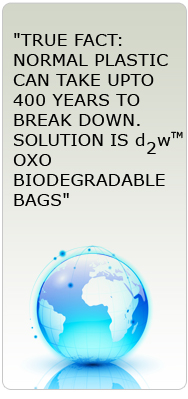
- Introduction
- What is d2w™ ?
- How does it work?
- Comprehensively Tested and Proven Technology – d2w™ certification
- Reduce , Reuse , Recycle
- d2w™ features
- Frequently Asked Questions and Answers
- Oxo- biodegradable Plastics Association Website
- Symphony's Website
- Download our Brochure [English/Arabic]
- Terms and conditions of sale
- d2Detector- An Anti-Counterfeiting and Quality Control Unit
Introduction
Plastic is fantastic!
Plastic is strong, flexible, durable, versatile, lightweight, safe and inexpensive. It is made from a by-product of oil refining which used to be wasted, so it makes good sense to make use of it and produce plastic instead of flaring it off.

However, Ordinary plastic bags and packaging can take up to 400 years to degrade! When plastic bags are improperly discarded, they remain scattered in our bushes, our trees, on our roads, in our rivers and seas, killing live stock and causing great damage to the environment.

What is d2w™
Ordinary plastic can be re-used and recycled –however if it gets into the environment it can last for many decades. Symphony Environmental Technologies PLC has found the solution to this problem by developing d2w™ additive, which is added during the production process - making it “oxo-biodegradable” or “oxo-bio” for short.

d2w™ oxo-biodegradable plastic has a pre-programmed life . At the end of this useful service life, the process of oxo-biodegradation starts and the plastic will be eventually broken down into water, carbon dioxide and biomass. The plastic will degrade and then biodegrade in the dark or sunlight, heat or cold, land or sea, leaving NO fragments , NO methane and NO harmful residues thus avoiding pollution and damage to the environment and wildlife. There is little or no extra cost and during its service-life strength and other characteristics are the same as ordinary plastic.
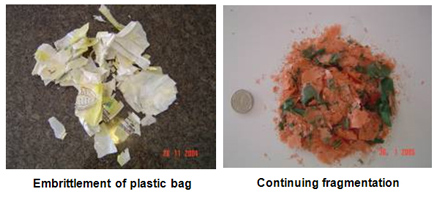
d2w™ is a low-cost insurance against the accumulation of plastic waste in the environment.
How does it work?
The degradation process is initiated at the time the polyethylene or polypropylene is extruded by the inclusion of a small amount of d2w™ additive, which works to break down the carbon-carbon bonds in the plastic leading to a lowering of the molecular weight and eventually to a loss of strength and other properties. Stabilisers work to ensure that a sufficiently long useful life is provided for each specific application. For example, a refuse sack might require a useful life of say 18 months before beginning to lose its strength whereas a bread bag might only require a few weeks.
Significantly, the d2w™ range does not need a biologically active environment to start degrading - this will happen even if the plastic is left in the open air or in the sea! This is very important if we are to address the serious litter problems caused by waste plastic. For this reason in particular, ‘oxo-bio’ plastic is preferable to ‘hydro-degradable’ e.g. starch-based plastic, which requires an active bio-environment before degradation will work.
Get Involved, Start Today… convert your packaging into d2w™ oxo-biodegradable plastic bags for a Greener Tomorrow!
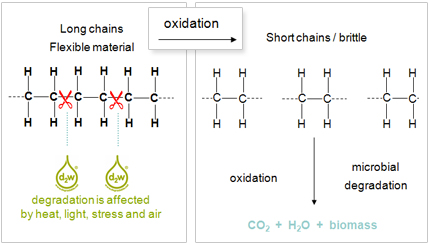

Comprehensively Tested and Proven Technology – d2w™ certification
d2w™ plastic additives have been extensively tested by independent laboratories that have been accredited as per ISO guidelines. These laboratories include Smithers/RAPRA Technology, Pyxis, OWS (Organic Waste Systems). The additive meets all the requirements of American Standard 6954- 04 for “Plastics that Degrade in the Environment by a Combination of Oxidation and Biodegradation.” Product development is on-going and confirmation of degradability of our customers’ products is included in Symphony’s routine quality-control procedures.
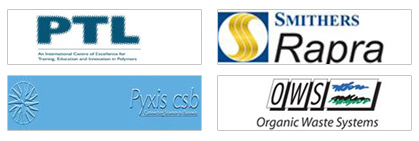
Degradation – Rapra Report
Biodegradation – Pyxis Report , Rapra Report
Certified food safe - Rapra Report , Keller and Heckman Certificate
The additives are suitable for direct food-contact, in compliance with EU Directive 2002/72
as amended and US FDA Code of Federal Regulations Chapter 21. Independent food contact
regularity assessments of d2w™ have been undertaken by Smithers/RAPRA.
Also, for more than 3 years
d2w™ has been used by major retailers around the world in food contact applications.
Environmentally safe - OWS Report d2w™ oxo-biodegradable additives have been successfully tested by OWS for soil safety and eco-toxicity.
Reduce , Reuse , Recycle
d2w™ oxo-biodegradable products are wholly consistent with these important environmental principles i.e, REDUCE , REUSE and RECYCLE . Also, the nature of the additive allows the very best available plastic technologies to be used to achieve minimisation of raw-material usage. During its service-life the product can be used and reused and will maintain its strength . d2w™ re-usable bags are commonly used nowadays
Recycled plastics are OK, but they are not degradable and will still lie around in the environment for decades. However, ordinary plastic and recycled plastic can now be made oxo-biodegradable using d2w™ additive. Conversely, d2w™ products can also be recycled effectively.
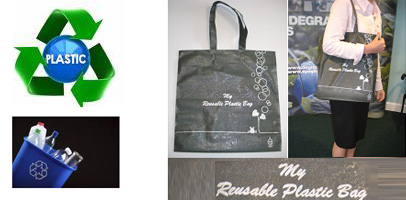
d2w™ Features
- Used with virgin & recycled polymers
- Inclusion Rate – Usually 1%
- Adjustable product life
The useful life of d2w™ oxo-biodegradable products is ‘programmed’ at the time of manufacture according to the customer’s requirements. A number of factors can accelerate degradation such as sunlight, heat and stress (stretching and tearing) and it will be slowed by chilling or freezing. Appropriate, but not special, storage conditions and stock-rotation are all that is needed.
Little or no additional cost
There is little or no additional cost This is because d2w™ oxo-biodegradable products can be made with the same machinery and workforce as normal plastic. There is no need to change suppliers also. The environmental and marketing benefits more than cover any small on-cost there may be.
No Compromise
d2w™ oxo-biodegradable plastics are are indistinguishable from the normal plastics during the useful life of the product. There is therefore no compromise on product features or performance.
Waste management systems
In the landfill d2w™ oxo-biodegradable plastic will continue to degrade while oxygen is present. Oxo-bio will not emit methane even in the absence of oxygen(unlike hydrobiodegradable , plastic, paper, cotton, car parking shade etc.). This is important because methane is a greenhouse gas 23 times more harmful than CO2. Oxo-bio can also be incinerated for energy-recovery.
